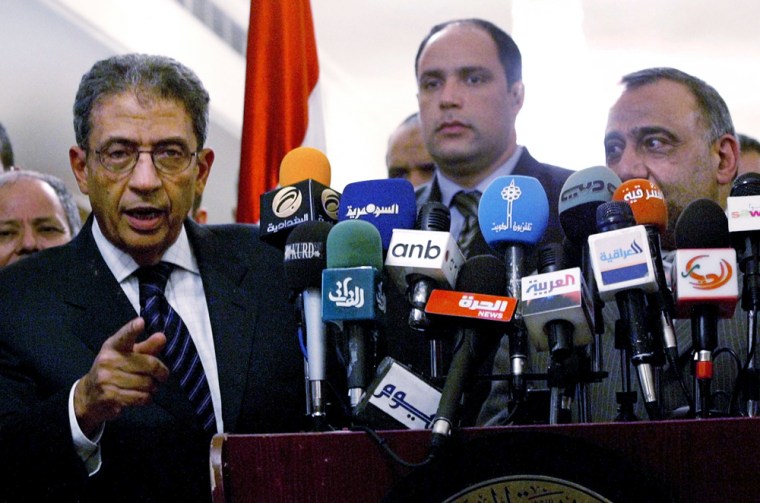The head of the Arab League on Thursday strongly condemned insurgent violence in Iraq, trying to overcome suspicion of the pan-Arab body from the country’s Shiite and Kurdish leaders on his first visit since the fall of Saddam Hussein.
Secretary-General Amr Moussa is trying to organize a reconciliation conference among Iraq’s sharply divided Shiites, Kurds and Sunni Arabs, the first major intervention by the Arab League in the country’s relentless bloodshed.
But he has faced reluctance from the Shiite and Kurdish leaders who lead the government, who have complained that the league has taken too long to seek a role, resent the league’s past support for Saddam, and are suspicious the mainly Sunni body is biased toward Iraq’s Sunni Arab minority.
Abdul-Aziz al-Hakim, the head of the top Shiite party in the ruling coalition, criticized the league at a news conference with Moussa for not clearly enough condemning Sunni insurgents, “terrorist groups, and pro-Saddam groups.” He complained the league has in the past only condemned the “Iraqis’ suffering.”
“Those statements are heard, but they are not enough when there was no condemnation to those criminals and the groups who committed these operations,” he said.
Standing next to al-Hakim, Moussa insisted, “We are against anyone who is fighting the Iraqi people, and the Arab League’s stand is clear because anybody harming innocent Iraqis, is committing a very dangerous operation that we would never accept.” Al-Hakim — in his clerical garb — nodded, saying, “Well said.”
“We also know that there are those who reject the presence of a foreign occupier,” Moussa went on, referring to U.S. forces in Iraq. “But we also understand that all these things should be resolved politically now.”
An Arab League delegation was attacked by gunmen last week while in the Iraqi capital to prepare Moussa’s trip. No one from the delegation was hurt, but two policemen guarding them were killed.
Iraqi leaders won’t commit to parley
In Moussa’s talks Thursday, Iraqi leaders still would not commit to holding a reconciliation conference. Prime Minister Ibrahim al-Jaafari said he had reservations over who would participate and suggested Iraqi politicians can address the issues of moderate Sunni Arabs on their own.
“I don’t believe we have a problem with certain parties or groups. Our political process is open and inclusive,” he said after meeting Moussa. “We will not have any meeting with those who are involved in killings and the senior members of former regime. But other Baathists we are dealing with them as ordinary people in the state.”
He also chided Moussa at their joint news conference, saying an Arab League “stance supporting our political process was late. We say this so we can build for the future. We hope from this visit to mark a new step in Iraqi-Arab relations through the league.”
Moussa said the league was a neutral force, saying, “I don’t represent a group, a trend or a political party, but rather everyone.”
Al-Jaafari has issues
The Arab League has stayed away from involvement in Iraq’s tumultuous post-Saddam changes, in part because many of its members opposed the 2003 U.S. invasion and felt supporting the political process afterward would condone it. Iraq’s new leaders have seen this as a refusal to recognize the new Shiite-Kurdish power in the country.
In comments to the Associated Press earlier this week, al-Jaafari suggested the Arab League should focus more on repairing its ties with Iraq, rather than on fixing them among Iraqis.
The league “had better start with the Iraq-Arab dossier. ... We need to open things like reconstruction, political, security and media support,” he said.
Government spokesman Laith Kubba took a softer approach Thursday, saying, “The Arab League has good connections to many parties in Iraq and can use these parties’ offices and power to back up the political process. These horizons are welcomed and will witness real support from the Iraqi government.”
